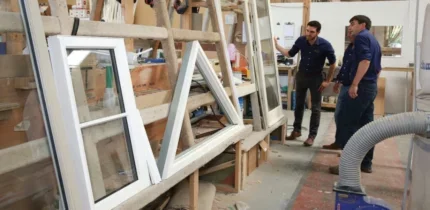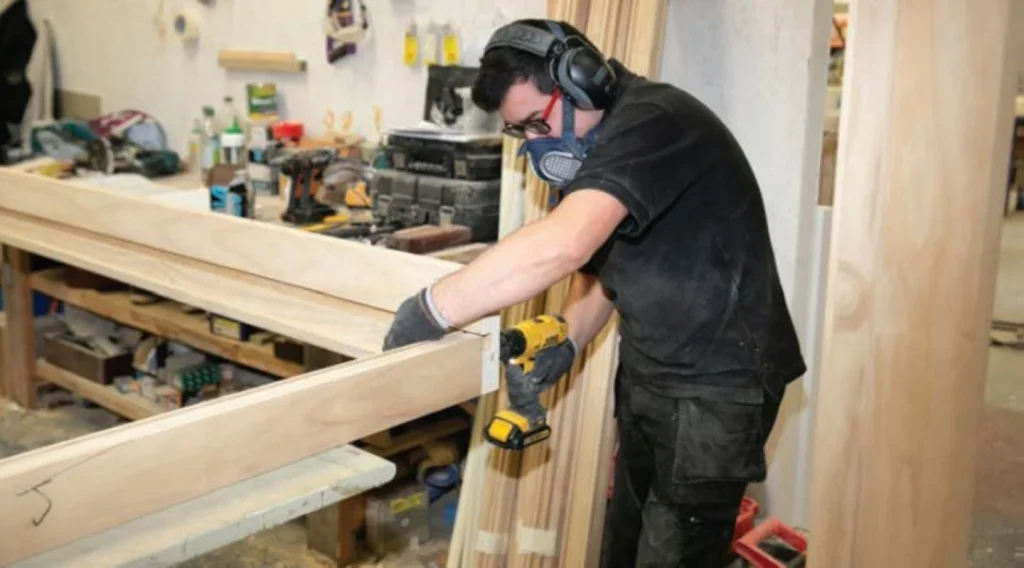
Stepping into my new role as BWF president, I’m excited to be supporting our members and the broader sector at a pivotal time. There are opportunities on the horizon stemming from the government’s commitment to the use of timber and net zero targets as well as regulatory and legislative changes that will shape our sector’s future.
From joining the family joinery business in 2011 with no experience in the woodworking sector, to today, where I’m managing director at Gowercroft Joinery and president of the BWF, I’m proud to be representing the continued growth of the sector that feels like my home.
In this piece, I’ll explore the key priorities of my presidency and how the BWF is poised to lead the way in delivering the support and guidance our members need.
GREEN OPPORTUNITIES
When I joined the woodworking and joinery sector, I was naturally drawn to working with timber due to its inherent sustainable and environmentally friendly benefits – not only can we craft products that bring joy, but they can also help us reduce our environmental impact compared to alternative materials.
This is why, alongside my colleagues at the BWF and across the timber industry, I fully support the government’s Timber in Construction (TiC) Roadmap. The TiC outlines a vision to increase the safe, sustainable use of timber in construction, helping to lower the overall carbon footprint of our built environment.

For the BWF and its members, this presents an incredible opportunity. We have the chance to champion the benefits of timber and wood products in sustainable construction, ensuring that our members’ offerings are front and centre in the push for sustainability. Aligning our activities with the TiC Roadmap priorities is crucial as we explore how members can highlight their green credentials – both in their operations and product offerings – and encourage the sharing of best practice.
Added to this, the UK government is committed to reaching net zero by 2050 and every industry has its key part to play. Without immediate change, we are already on the road to climate crisis and now is the time for the construction industry to turn to timber as part of the solution.
At the BWF we will continue to champion sustainably sourced timber for its low embodied carbon footprint and environmental benefits through our ongoing awareness and educational campaigns.
THE NEXT GENERATION
To meet the challenges of the climate crisis, we need timber, and to get timber to the masses, we need a new generation of skilled professionals equipped with fresh ideas and energy.
For example, the government has recently announced a long-term vision to deliver new communities with at least 10,000 new homes. However, achieving this vision in line with net-zero goals requires not only sustainable materials but also the skilled workforce to build with them.
This, combined with the introduction of the Skills England Bill, presents a pivotal moment to reassess and enhance local and regional training opportunities, especially in industries like ours that have long faced skills shortages. Addressing the skills gap has been a top priority for the BWF for many years, and this focus is now more important than ever.
Young people entering our industry today have immense potential to drive change, bringing fresh and innovative ideas. It’s our responsibility to highlight how woodworking and joinery has evolved and to showcase the exciting opportunities available to them — whether it’s working with cutting-edge timber technologies or being part of businesses that create stunning, sustainable solutions.
Throughout my time at Gowercroft Joinery, we have always emphasised the value of apprenticeships, like many BWF members. Currently, over 10% of our workforce is in active apprenticeships and a further 20% graduated apprentices. This has allowed us to build a team where young professionals take ownership of their roles and grow into leadership positions, driving success across all aspects of the business –from sales and production scheduling, to finance, manufacturing, and installation.

As BWF president, I’m looking forward to championing the value of apprenticeships to our sector and highlighting to those looking to enter our profession, how an apprenticeship offers a fantastic route to a fulfilling career.
REGULATORY CHANGES
There are regulatory and legislative changes on the horizon that will impact our members, the woodworking and joinery sector, as well as the wider construction industry. The recommendations from the Grenfell Tower Inquiry Phase 2 report and the Building Safety Bill will drive forward a greater focus on accountability regarding fire safety within the construction industry, while the Future Homes Standard aims to decarbonise new homes.
At the BWF, we are embracing these changes, which are bringing not only opportunities to the woodworking and joinery sector, but also positive change to the broader industry.
READY TO DELIVER CHANGE
The BWF is committed to delivering unparalleled support, advice, and guidance to our members. The resources and knowledge we have, I believe are second to none in terms of trade associations. We are constantly reviewing our offering and exploring new and innovative ways of bringing expertise into our organisations.
The British Woodworking Federation is uniquely positioned to drive the change our sector needs, and I’m incredibly proud to be at the forefront of that work.





